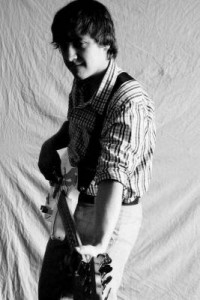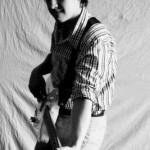 In Polish reggae there are known examples of wrong band names. Aren’t you afraid that name DUP! could define the project as not too serious? (“dup” in Polish is an inflexion of word meaning “butt”)
In Polish reggae there are known examples of wrong band names. Aren’t you afraid that name DUP! could define the project as not too serious? (“dup” in Polish is an inflexion of word meaning “butt”)
It’s not like that. Indeed, we wanted to make a joke, because we have such a group humor sense. We knew that we want to make a lot of noise, a less lirycal form of dub, oriented in crunching, simmering sounds just like in old Jamaican records. Everyone knows that it’s about a “clap”, not the butt. On the album there is a lot of humor. Song titles are controversial (my favourite one – “Ping-pong with the British Queen” – note: translator) because we didn’t want the project to be totally serious. It’s niche music and there is no need to make a huge case of it. I’m a bit afraid that people will be having trouble with inflecting the name. For example, the band’s myspace could be called assy, or something like that (laugh).
Who recorded the album with you?
Drummer is Marek “Siekierka” Sieroszewski known from Tumbao, Tumbao Riddim Band and Jamal. Tomek Krawczyk from Paprika Korps plays on the bass. Me and Tomek Księżopolski are guitarists. My other half recorded vocals to two of the tunes so that someone sings out there. We know eachother for a long time and we always thought of recording an album like that.
What will the band’s lineup look like during concerts?
It will be the same as the study one. For now we have troubles with arranging the technical side of it because on the album a lot of sounds are made by machines, not the musicians. I mean all of the delays, reverbs and other strange ideas of making sounds. We would like someone to manage the console during the concerts, so the band would be kind of a multitrack. Just like Perch in Zion Train. However, first we would have to put it all together, make some tryouts. We don’t have to make it before holiday. Summer festivals have full line-ups anyway. For now we focus on the second album, and then we will think about playing live.
Your records show that you intensively and very effectively tried to get sound similar to old Jamaican classics from 70’s. How did you accomplished an effect like that in the hour of digital technique?
We did it the old-school style. Drums were modified, we swathed the snare with a rag. You know, all of the techniques that you can see on old movies and photos. Thanks to our friends we have been able to buy old, “vintage” equipment in reasonable prices. The room that we have been working in is very insulated. We tried to make the final effect sound like music that we like – 70’s Jamaican dub. We could be accused of trying to copy something. Bass player of Asian Dub Foundation in “Dub Echoes” movie stated that you can play like King Tubby, but it’s not the thing. However, for us it was. Nowadays everyone records reggae albums oriented in radio sound and we crossed out the radio on the very beginning. On the Dup! album there will be no strict entertainment tunes.
How did the recording process look like?
I had some ideas for chords and melodies. I knew that I wanted to have some particular drum rhythms that I like, for example classic “meltdown” with marley-ish hi hat division. It’s one of my favourite reggae drum rhythms. I’ve been saving sketches of songs in Cubase. Next we started our group work. At the beginning our bassist Tomek didn’t record with us. Siekierka got his metronome and we recorded our drum ideas with Księżyc. I had a lot of fun recording drum instruments. I forget that our buddy Adaś (Mościcki – note: editor), who plays with Maleo Reggae Rockers is free and able to do it. I had some ambition although and I bought some noise makers. I played them, what brought a lot of joy to me.
How did you get the idea to release a classic dub album today, when dancehall is far more popular?
There is a lot of dancehall and modern vibes now. Everyone tries to create something as good as others and as an effect all of the tunes are similar. We didn’t have that pressure because we planned to do particular thing. Reggae is a piece of music that, when you approach it harmonically, it turns out that everything was already used. All of the melodies were played, sang, all of the posible chord combinations. That’s why we aren’t afraid that it will sound like “Kingston Dub” by Tubby.
Is Dup! project a diversion from your role in Jamal for you?
In Jamal we use a lot of electronic. In our concert set we have only two real reggae tunes. The rest is crazy electronic vision of Genia, who herds us to perform harder, more demanding work with loops and continuous metronome play. In the process of recording Dup! we could let ourselves play loose and do anything that we like. It was very spontaneous, without any stress that it has to be innovative. Such an album that you play, you don’t notice when it ends and you replay it.
The album is to be released by a “non-reggae” label. How did you establish the cooperation? Do you think it will bring benefits?
The album is going to be released by Jamajka Music – firm created by Majka Jeżkowska. It’s an independent label. Majka releases her records on her own, only the distribution is done by someone else. I know her because my girlfriend is in her concert dancing crew. We met few times and she has been infected with the idea: “Maybe you will release such an independent album, why not? It could be fun, it will bring back for sure”. We’ve been talking and Majka finally approved. She said that it’s a good idea. Here comes our sense of humor: if there is Jamajka Music label there is no way that anybody else could release us (laugh). It could be fun if the album will be released abroad and some rastaman checks the web page of the label and he sees a doggie or a cat (laugh).
Is it hard to release dub music in Poland and is it more of a hobby than a business?
In Poland it’s a very niche music and it’s released for joy. We don’t have such a music culture here to spread dub anywhere. You can look what is listened to in Germany, where bands like Seed are great stars like Maryla Rodowicz here. Maybe I exaggerate a bit, but the scale is similar. Or the New Zealand, where even pop productions include a lot of delay, pulsation, are spatial. When you release a 300 copies of an album, like it was with 12″ vinyl “Tell Me/Otwórz Oczy” (Echo TM meets EMZK – note: editor), you have almost all of the receivers counted. You know who bought them, you know their names (laugh). This scene will grow, but are still low because there is a few listeners. Maybe this music will get to radio, but it’s a matter of changing the generation. More and more people listen to music like that, but it’s not promoted.
Who are your favourite dub producers?
I appreciate King Tubby tge most. It’s a venerable music, but I’m still impressed that a man using two or maximum four tracks were able to do something like that. I respect him as an constructor as well because he were able to take soldering tool and modify the device that wasn’t good enough for him. I also impressed by Vienna scene e.x. Tosca, Kruder & Dorfmeister or a man called Stereotyp. Every tune includes a dub element: complex delays, pulsation or exposed bass. Not to forget band named Seed, although not too dub-ish, their production, sound and arrangement are world class. Jamaican are far, far behind them.
Interview made in collaboration of dubmassive.org crew and music editoral crew of Radio UWM FM. Interviewer: Michał Napiórkowski, UWM FM

